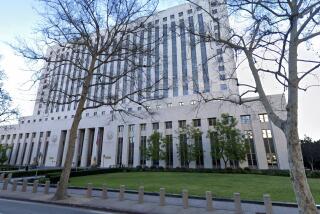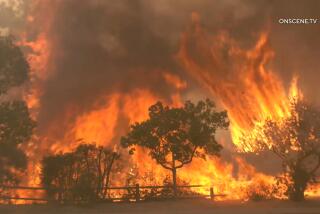Priest’s Recording of Confession Violated Privacy, Suit Charges : Courts: A former youth minister whose three trials for molestation ended in hung juries wants the tape turned over to him.
A former Burbank youth minister whose three trials on charges of molesting a teen-age boy ended in hung juries has sued an Episcopal priest who tape-recorded a confession allegedly concerning the sexual allegations.
David Rickard, 40, former youth pastor--a lay staff worker--at St. Jude’s Church in Burbank, says in the lawsuit that the church’s rector, Father Michael T. Flynn, violated Rickard’s privacy and the confidentiality of confession.
The suit asks that the tape be turned over to Rickard of Sierra Madre or taken by the court. Also named in the suit, filed Nov. 28 in Burbank Superior Court, are St. Jude’s and the Episcopal Diocese of Los Angeles.
On Dec. 6, Judge Thomas J. Murphy sealed the court record and ordered all those involved in the case not to talk about it.
Confession is a church rite under which a person admits wrongdoing to a priest for the purpose of forgiveness. Under California law, a clergyman cannot be forced in court to reveal the contents of a confession, in the same way that the law protects conversations between doctors and patients or attorneys and clients.
Rickard has denied engaging in a sexual relationship but admitted feelings of attraction for the youth. He said Flynn urged him to confess, then misconstrued his words as an admission he had sex with the youth.
Flynn, 50, rector at St. Jude’s for nine years, declined to comment. Canon Bruce MacPherson, a spokesman for the diocese, said he was unfamiliar with details of the case but that under Episcopalian practice a confession “would not be divulged.” He said, however, that tape-recording a confession does not violate church policy.
Rickard was tried in 1989 in Redding and in 1989 and 1990 in Pasadena Superior Court on 120 charges of oral copulation with a 15-year-old boy who was in Rickard’s Bible study class.
The youth, now 20 and married, spent time with Rickard in Sierra Madre and later, with his parents’ permission, moved with Rickard to Northern California in 1985.
The parents learned of the alleged sexual relationship in 1987 and notified authorities. Charges were dismissed this year in both sites after the third jury deadlocked in Pasadena in August.
But after the Pasadena trial, and before Deputy Dist. Atty. Robert de Carteret had decided whether to try Rickard again or dismiss the charges, Flynn wrote de Carteret on Nov. 20, requesting that de Carteret spare the boy and his family the ordeal of a fourth trial. To support his plea, he revealed the existence of the taped confession, arguing that he could use it to control Rickard’s future behavior.
In the letter, Flynn said the tape “was probably not admissible in a court of law, but it will be held secure for other use should Mr. Rickard’s future behavior require its utilization.”
De Carteret said he did not try to obtain the tape as evidence because it is protected under California law. A week later, de Carteret decided not to try Rickard again and charges were dismissed.
But by filing a suit against Flynn in which the tape is an issue, de Carteret said Rickard may have legally waived his right to keep it private. And so he began reconsidering moving for another trial, the prosecutor said, until the judge imposed the gag order that blocks access to the tape.
Bill Rodiger, vice chancellor of the diocese and an attorney, said the diocese and the bishop will probably have little role in the lawsuit because Episcopal churches are independently run. Each church elects its own clergy, Rodiger said.
Rodiger said the lawsuit could center on the legal difference between a “confession” and a “conversation.”
A similar case about 10 years ago in Northern California made such a distinction, he said. A woman convicted of stealing church money sued her priest, who had reported the theft because he interpreted her admission to him as a conversation. She lost.
The lawsuit seeks unspecified damages. Rickard has said previously that he spent more than $90,000 defending himself.
More to Read
Sign up for Essential California
The most important California stories and recommendations in your inbox every morning.
You may occasionally receive promotional content from the Los Angeles Times.






